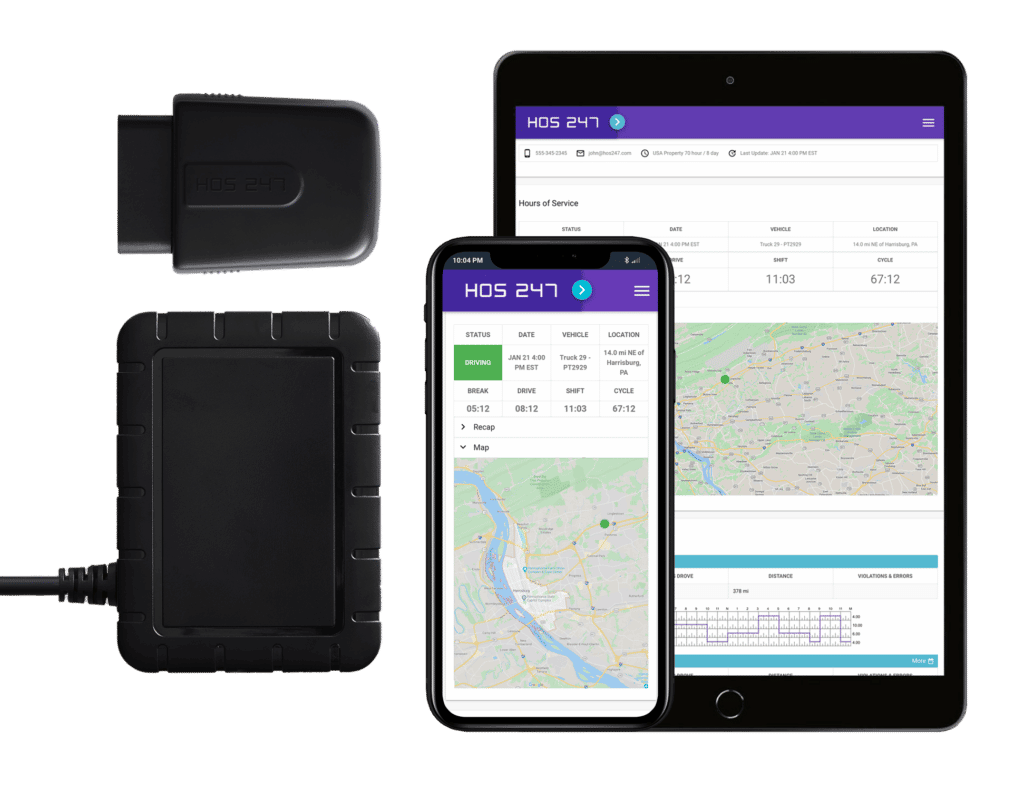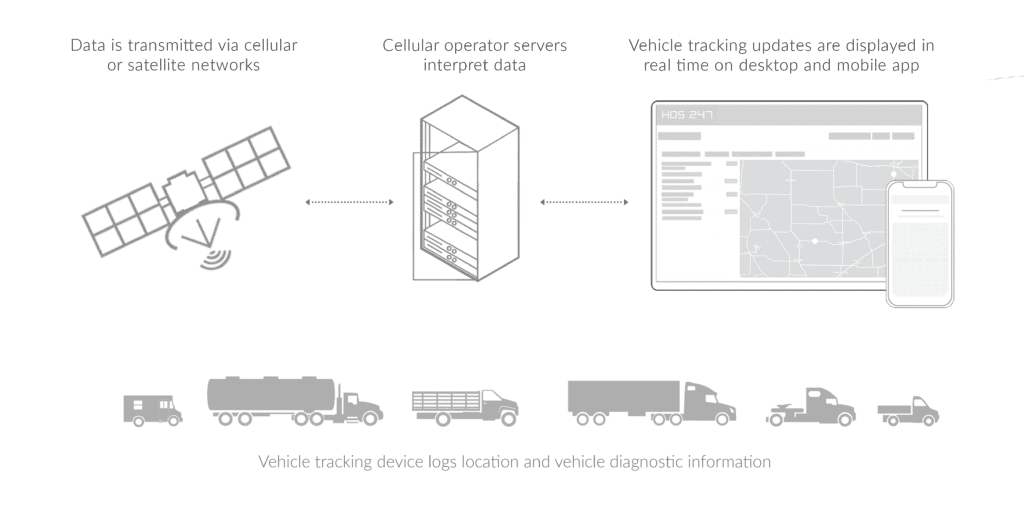In today’s logistics industry, knowing where your vehicles are and how they’re performing is essential for staying competitive. Modern GPS fleet tracking systems have transformed from simple location markers to comprehensive management tools that provide real-time insights into every aspect of fleet operations.
A GPS fleet tracking system is one of the most advanced and informative methods for logistic and transportation companies to keep an “eye in the sky” style perspective of their transportation infrastructure and fleets. By combining vehicle-mounted tracking devices with sophisticated software platforms, these systems deliver unprecedented visibility into fleet operations.
What Is a Fleet Tracking System?
A fleet tracking system is a technological solution designed to monitor, manage, and optimize the operations of vehicles within a fleet. Using GPS (Global Positioning System) technology, these systems provide real-time data on vehicle locations, performance metrics, and driver behavior. Fleet tracking goes beyond basic location tracking, acting as a comprehensive tool that streamlines logistics, reduces operational costs, and enhances safety measures.
The key components of a fleet tracking system include:
- Vehicle-mounted GPS devices. These small, discreet devices collect data on vehicle position, speed, route history, and more.
- Software platform. A centralized hub where fleet managers can access and analyze real-time data, generate reports, and monitor fleet performance.
- Communication networks. Systems typically utilize 4G/LTE cellular networks to transmit data quickly and reliably.
- Mobile and web applications. Accessible dashboards allow fleet managers to stay informed and make decisions from anywhere.
Fleet management GPS tracking systems help managers maintain control over their fleet, ensuring drivers follow pre-set routes, comply with hours of service regulations, and operate vehicles efficiently. The result is a more productive fleet, reduced fuel consumption, and improved customer satisfaction.
Do you have any questions? Talk to ELD Advisor: 650-405-3372 or Request Callback
Top GPS Fleet Tracking Systems
Choosing the right GPS fleet tracking system can be challenging given the variety of options on the market. Below are some leading providers offering solutions to meet the needs of logistics professionals:
HOS247
A comprehensive fleet management solution offering real-time GPS tracking, automated IFTA reporting, and electronic logging device (ELD) compliance tools. The platform features an intuitive interface, multilingual support, and flexible pricing plans with no long-term contracts. Notable features include live fleet tracking, maintenance reminders, and driver behavior monitoring to enhance operational efficiency.
Motive
Known for its AI-powered fleet management platform that combines GPS tracking with advanced analytics. The system offers features like automated workflow management and real-time visibility into fleet operations.
Geotab
Provides telematics solutions with a focus on data analytics and fleet optimization. Their platform includes features for route optimization, fuel management, and regulatory compliance monitoring.
GPS Insight
Offers customizable fleet tracking solutions that include detailed reporting capabilities, maintenance scheduling, and driver safety monitoring tools.
Verizon Connect
A fleet management platform that combines GPS tracking with comprehensive reporting tools, offering features like fuel monitoring and route optimization capabilities.
Selecting a reliable provider is crucial to ensure seamless integration with your fleet’s operations. A dependable system will not only provide accurate data but also enhance productivity, improve compliance, and support long-term business growth. Look beyond the GPS fleet tracking system cost to choose the right GPS fleet tracking solution, so managers can drive their operations toward efficiency and success.

Mapping the Future of Logistics
This vast range of information gives fleet controllers and business leaders the power to maintain an efficient and coordinated service while also allowing businesses to reduce costs and improve service delivery timing. The importance of fleet tracking in the logistics and transport sectors cannot be understated, and it requires clear and up to date mapping. Leading fleet tracking services have combined with prominent mapping services, such as Google Maps to provide the best service possible for users.
This allows fleet coordinators to use web browsers to zoom down to street level and gather information on a variety of road aspects, including real-time traffic information, road maintenance and closure details, as well as alternative routing options. As such this means that a GPS fleet tracking service can help not only coordinators but vehicle drivers as well.
As the world modernizes, the requirements of consumers have become more complex. With orders for both big business distribution in the advanced industry structures, to the home delivery of online buyers now requiring exact timing and locations of transported goods as a business standard. The advancing world of logistics requires precise and complex data to ensure that everything is moving exactly as planned.
GPS Fleet Tracking is Getting Faster
While fleet tracking systems are not exactly new to the world of transportation and logistics, they are advancing at the same rapid pace as the wider world. With the development of new means of interconnection between internet services, so too is the rate and amount of information that can be gained from fleet transportation systems growing and advancing.
For example, the move from 3G internet networks to the now far more advanced 4G/LTE connection services, which are prominent throughout the United States, much of central Europe and many other regions of the globe has meant that fleet tracking systems have become far more responsive. This upgrade has meant that both users, coordinators and consumers are receiving far greater response timings as well as much more developed data yields.
The switch to 4G is the start of changing times in the sector
This advancement in communication means that while transportation structures now have the opportunity to build a more productive and performative fleet network, which will lead to a more efficient use of fleet resources. This upgrade does mean that the clock is now ticking for logistic providers to upgrade and modernize with the time.
The upgrade of 3G networks to the new 4G system means that for many, the time to update their fleet tracking system is now as while 3G systems won’t end overnight, the growth of more advanced communication for tracking systems will revolutionize the sector and businesses that wish to move with the times must act fast.
Leaving the question, what is the best action for your company to modernize?

Fleet Tracking for a Competitive Advantage
Dispatchers long ago had to coordinate hundreds of drivers with just phones and a logbook, costing business hundreds of hours in long explanations, route planning and much more hassle. However, with the combination of an effective fleet tracking system and dispatching software like HOS247, businesses eliminate the need for time consuming calls and can have drivers on route in a matter of minutes.
Fleet GPS systems are simple to install, efficient and time saving, allowing fleet managers to assign jobs in a matter of seconds, while the software prioritizes the most efficient means of transport and informs drivers via the app. This gives dispatchers the power to queue up a series of jobs for a driver’s entire day in just a few moments, eliminating the need for time consuming calls for every job and giving dispatchers the overview needed to ensure logistics are moving as needed.
Fleet tracking systems provider HOS247 is a leading pioneer in the development of advanced 4G fleet tracking systems. These tools help to reduce business overheads and greatly improve efficiency and real-time information relay for fleet administrators.
The HOS247 4G/LTE tracking system is reliable and easy to use, providing live location and vehicle data from the installed GPS tracking device via Global Positioning Systems. These then transmit data wirelessly to HOS247 servers via 4G/LTE cellular networks and once the data is analyzed by the tracking system, it is displayed via the fleet manager portal on a computer, tablet, or smartphone. As such HOS247 provides users with the means to stay connected with their fleet, no matter where they are.
HOS247 GPS Tracking System
Whether users are a local business with a singular delivery vehicle or the head of logistics for a multi-million dollar transportation company, HOS247 can provide everything needed to ensure fleet coordinators and company leaders receive live, real time location data on all linked vehicles with 4G speed.
Other than giving fleet coordinators a huge amount of live, accurate data on countless aspects of their vehicles, the benefits of using a HOS247 4G tracking device are endless. Effective fleet tracking systems allow industry leaders to make changes to their fleet structures and routing that improves a variety of aspects of their logistic services. The advantages and benefits of our fleet tracking system include:
| Advantage | Benefit |
|---|---|
| By installing real time and location accurate tracking devices, fleet coordinators can ensure they reduce business spending by guaranteeing drivers operate vehicles at approved speeds and use only pre-set routing options for maximum efficiency. | This gives companies the power to save money on fuel and ensure less vehicle damage from unfavorable routes. Live location ensures controllers can make certain drivers do not deviate from the preset routes or take uncoordinated stops, guaranteeing greater control of company time. |
| HOS247 GPS fleet tracking systems ensure security and safety for company vehicles as the GPS system will not only help to prevent theft, but also alerts coordinators when the vehicle has been in an accident. | This allows business leaders to get a representative involved quickly who will also have access to a significant amount of information on factors such as vehicle speed and so on before and during the crash, giving representatives prior knowledge to deal with the situation. |
| A GPS tracking device system means that fleet coordinators will have live info on all company trucks inner workings, keeping dispatchers aware of any damages or degradation, and providing management with the foresight to coordinate maintenance. | This ensures that all company vehicles will be in the best condition at all times and will reduce the cost and time consumption of unplanned breakdowns throughout a company’s fleet. |
HOS247 is quick to install and simple to use:
- HOS247 uses easy to install tracking boxes which are small and discreet, meaning that there will be no need to take any vehicles off the road for long periods due to complicated electrical installments.
- Fleet coordinators can have accurate data up to date and ready to roll, with minimal disruption to an organization’s logistic network, by allowing for quick installation of tracking units.
- Once installed the access to their software is easy and simple to use and only requires an internet capable operating system, and thus gives business leaders the option to get a fleet management hub up and running without delay and limited preparation.
Additionally, HOS247 fleet tracking systems provide companies with all the data needed to ensure that vehicles are kept safe, well maintained, and efficiently supporting business needs.
However, these aren’t the only benefits to an efficient fleet tracking service and with the right equipment company shareholders can ensure that company trucks and vans are always complying with the rules and regulations of the Federal Motor Carrier Safety Administration (FMCSA). This guarantees that a business is in line with both State and Federal laws, while ensuring drivers don’t overwork themselves, keeping employees safe and supported.
By using effective fleet vehicle GPS tracking systems, fleet coordinators can make sure that drivers are obeying their hours of service before it is too late. With an advanced fleet tracking system, a coordinator will be notified when a driver is approaching the end of daily allocated driving hours, allowing the fleet organizer to give warning, and ensure drivers have the forewarning they need to prepare for a stop.
This guarantees that a business is always complying with Department of Regulations standards, giving both shareholders and drivers peace of mind.

How to Choose a Fleet Tracking System
Selecting the right fleet tracking system requires a thoughtful assessment of your fleet’s unique needs and operational goals. Here are key factors to consider:
- Compatibility with your fleet’s needs. Ensure the system aligns with your fleet size, vehicle types, and specific requirements like compliance tracking or route optimization.
- Network technology and coverage. Opt for systems with reliable network coverage in your operational areas to prevent data gaps.
- Ease of use and accessibility. Choose platforms that are user-friendly, with intuitive dashboards and mobile apps that support on-the-go management.
- Customization and scalability. Look for solutions that can be tailored to your current needs and scaled as your fleet grows.
- Vendor support and reputation. Research vendor reviews and prioritize companies known for excellent customer support, robust training resources, and long-term reliability.
By focusing on these factors, you can select a system that boosts efficiency, ensures compliance, and supports your business growth.
Do you have any questions? Talk to ELD Advisor: 650-405-3372 or Request Callback
Industry Trends and Innovations in Fleet Tracking
With the growth in apps and software across the globe, every industry is becoming faster and more coordinated and the logistics sector is no different. The streamlining of fleet tracking systems means companies can ensure that not only their vehicles and staff are safe and well maintained but that shareholders are getting the best value and providing the most efficient service possible for their customers, thus guaranteeing that company logistics move forward faster.
The fleet tracking industry continues to evolve with advancements in technology. Emerging trends and innovations include:
- AI and machine learning. Artificial intelligence enables smarter route planning, driver behavior analysis, and predictive maintenance by processing vast amounts of fleet data.
- Telematics integration. Combining GPS with telematics offers deeper insights into vehicle diagnostics, fuel efficiency, and real-time performance metrics.
- Predictive analytics. Leveraging historical and real-time data to forecast maintenance needs, optimize routes, and enhance operational efficiency.
- IoT devices. The Internet of Things facilitates enhanced connectivity between vehicles and fleet management platforms, providing more comprehensive data.
- Cloud-based solutions. Cloud technology ensures secure, scalable, and real-time access to fleet data from anywhere.
These innovations complement traditional fleet GPS tracking systems, empowering fleet managers with tools to stay ahead in a competitive landscape. Embracing these trends not only enhances operational efficiency but also positions businesses to adapt to future challenges effectively.

Conclusion
Fleet tracking systems have become indispensable for businesses seeking to streamline operations, enhance safety, and boost profitability. By understanding the core components and exploring the top providers, companies can identify solutions tailored to their unique needs. Additionally, keeping an eye on emerging technologies like AI and telematics ensures that fleet managers remain at the forefront of industry innovations. Investing in a reliable fleet tracking system is more than a technological upgrade—it’s a strategic decision that paves the way for sustained growth and operational excellence.

I’ve co-founded, built and managed several transportation-related businesses. Now, I’m a founder and CEO of HOS247 – an AI Transportation Platform for trucking companies, freight brokers and other logistics operations. We are transitioning old-style operations to technology-advanced logistics entities and help them to grow their businesses. ELDs (electronic logging devices), fleet tracking and management 2.0 combined with AI-powered dispatch tools.












In an industry where time is money, owner-operators are constantly seeking the best tools to enhance their efficiency and ensure compliance with stringent regulations. Electronic logging devices (ELDs) have become a crucial part of this quest. However, navigating the vast

At First, Free ELD Devices With No Monthly Fee Sounded Like a Good Idea Owner-operators who had every intention of being part of the trucking industry long-term were initially attracted to the idea of an ELD device with no monthly

Since the “Moving Ahead for Progress in the 21st Century” bill in 2012, the trucking and commercial transportation industry has gone through an important adjustment in regard to electronic logging devices (ELDs). Traditional paper logbooks and automatic onboard recording devices